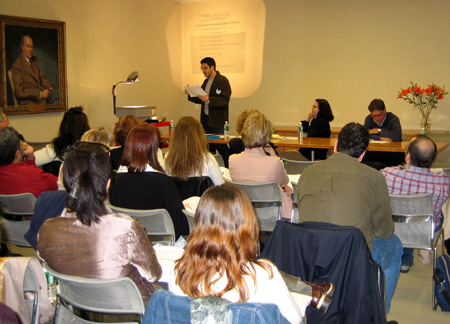New Directions in the Anthropology of Markets
Date
Apr 9, 2005Organized by
Koray CaliskanLocation
Wenner-Gren Foundation, New York, NYParticipants
- Zuhre Aksoy New York U.. USA
- Koray Caliskan, organizer New York U., USA
- Michel Callon Ecole des Mines, France
- Nejat Dinc Stanford U., USA
- Julia Elyachar Slovene Academy of Sciences and Arts, Slovenia
- Laura Kaehler Graduate Center, City U. of New York, USA
- Vincent Lepinay Columbia U., USA
- Peter Levin Barnard College, USA
- George Marcus Rice U., USA
- Tim Mitchell New York U., USA
- Viviana Zelizer Princeton U., USA
ORGANIZER’S STATEMENT: “The Anthropology of Markets” was the first public workshop held at the Foundation’s new offices. Anthropologists, sociologists, and political scientists came together for a day to begin a discussion on the nature of today’s global markets and addressed the question of what, for anthropologists, is a global market? The day was organized around four sessions. The first focused on “The Earth of Markets.” This session approached markets from the vantage point of the countryside and rural producers. The second session explored “The Rhythms of Markets” and made visible the global nature of markets from the vantage point of financial production. Following these two sites of exchange/production, the third session, “The Making of Markets,” focused on the way markets are studied in anthropology and mapped the current state of literature. The final session, “Science, Technology and the Multi-Sited Faces of Markets,” pulled together themes that had emerged over the course of the day. Overall, the international workshop addressed the following questions by drawing on the empirical framework of five exciting ethnographies of markets:
- How do various agents of markets in their local and/or global articulations relate (or not) to one another and to the object of exchange?
- How do various social actors conceive of their engagement with a global market and where do the find their agency within this market?
- What role, if any, do abstract scientific statements and approaches play in relations of power in these contexts?
- How relevant is the embeddedness argument that prefigured one of the longest and richest debates of anthropology, namely that between formalists and substantivists in the age of market reform?
- How do the relations of signification, production and exchange, in this multi-local context of markets, connect social positions to power?
